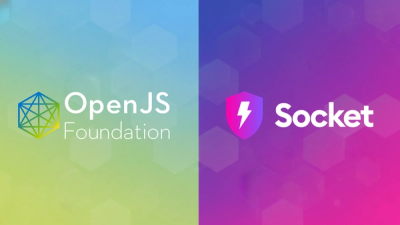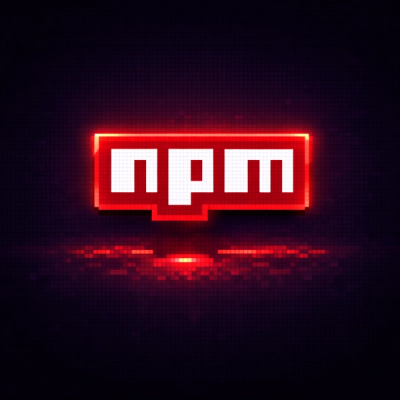
Research
SANDWORM_MODE: Shai-Hulud-Style npm Worm Hijacks CI Workflows and Poisons AI Toolchains
An emerging npm supply chain attack that infects repos, steals CI secrets, and targets developer AI toolchains for further compromise.


Dotenv is a zero-dependency module that loads environment variables from a .env file into process.env. Storing configuration in the environment separate from code is based on The Twelve-Factor App methodology.
Install it.
npm install dotenv --save
Create a .env file in the root of your project:
# .env
S3_BUCKET="YOURS3BUCKET"
SECRET_KEY="YOURSECRETKEYGOESHERE"
And as early as possible in your application, import and configure dotenv:
require('dotenv').config() // or import 'dotenv/config' if you're using ES6
...
console.log(process.env) // remove this after you've confirmed it is working
That's it. process.env now has the keys and values you defined in your .env file:
Import with ES6:
import 'dotenv/config'
ES6 import if you need to set config options:
import dotenv from 'dotenv'
dotenv.config({ path: '/custom/path/to/.env' })
bun add dotenv
yarn add dotenv
pnpm add dotenv
For monorepos with a structure like apps/backend/app.js, put it the .env file in the root of the folder where your app.js process runs.
# app/backend/.env
S3_BUCKET="YOURS3BUCKET"
SECRET_KEY="YOURSECRETKEYGOESHERE"
If you need multiline variables, for example private keys, those are now supported (>= v15.0.0) with line breaks:
PRIVATE_KEY="-----BEGIN RSA PRIVATE KEY-----
...
Kh9NV...
...
-----END RSA PRIVATE KEY-----"
Alternatively, you can double quote strings and use the \n character:
PRIVATE_KEY="-----BEGIN RSA PRIVATE KEY-----\nKh9NV...\n-----END RSA PRIVATE KEY-----\n"
Comments may be added to your file on their own line or inline:
# This is a comment
SECRET_KEY=YOURSECRETKEYGOESHERE # comment
SECRET_HASH="something-with-a-#-hash"
Comments begin where a # exists, so if your value contains a # please wrap it in quotes. This is a breaking change from >= v15.0.0 and on.
The engine which parses the contents of your file containing environment variables is available to use. It accepts a String or Buffer and will return an Object with the parsed keys and values.
const dotenv = require('dotenv')
const buf = Buffer.from('BASIC=basic')
const config = dotenv.parse(buf) // will return an object
console.log(typeof config, config) // object { BASIC : 'basic' }
Note: Consider using
dotenvxinstead of preloading. I am now doing (and recommending) so.It serves the same purpose (you do not need to require and load dotenv), adds better debugging, and works with ANY language, framework, or platform. – motdotla
You can use the --require (-r) command line option to preload dotenv. By doing this, you do not need to require and load dotenv in your application code.
$ node -r dotenv/config your_script.js
The configuration options below are supported as command line arguments in the format dotenv_config_<option>=value
$ node -r dotenv/config your_script.js dotenv_config_path=/custom/path/to/.env dotenv_config_debug=true
Additionally, you can use environment variables to set configuration options. Command line arguments will precede these.
$ DOTENV_CONFIG_<OPTION>=value node -r dotenv/config your_script.js
$ DOTENV_CONFIG_ENCODING=latin1 DOTENV_CONFIG_DEBUG=true node -r dotenv/config your_script.js dotenv_config_path=/custom/path/to/.env
Use dotenvx for variable expansion.
Reference and expand variables already on your machine for use in your .env file.
# .env
USERNAME="username"
DATABASE_URL="postgres://${USERNAME}@localhost/my_database"
// index.js
console.log('DATABASE_URL', process.env.DATABASE_URL)
$ dotenvx run --debug -- node index.js
[dotenvx@0.14.1] injecting env (2) from .env
DATABASE_URL postgres://username@localhost/my_database
Use dotenvx for command substitution.
Add the output of a command to one of your variables in your .env file.
# .env
DATABASE_URL="postgres://$(whoami)@localhost/my_database"
// index.js
console.log('DATABASE_URL', process.env.DATABASE_URL)
$ dotenvx run --debug -- node index.js
[dotenvx@0.14.1] injecting env (1) from .env
DATABASE_URL postgres://yourusername@localhost/my_database
Use dotenvx for encryption.
Add encryption to your .env files with a single command.
$ dotenvx set HELLO Production -f .env.production
$ echo "console.log('Hello ' + process.env.HELLO)" > index.js
$ DOTENV_PRIVATE_KEY_PRODUCTION="<.env.production private key>" dotenvx run -- node index.js
[dotenvx] injecting env (2) from .env.production
Hello Production
Use dotenvx to manage multiple environments.
Run any environment locally. Create a .env.ENVIRONMENT file and use -f to load it. It's straightforward, yet flexible.
$ echo "HELLO=production" > .env.production
$ echo "console.log('Hello ' + process.env.HELLO)" > index.js
$ dotenvx run -f=.env.production -- node index.js
Hello production
> ^^
or with multiple .env files
$ echo "HELLO=local" > .env.local
$ echo "HELLO=World" > .env
$ echo "console.log('Hello ' + process.env.HELLO)" > index.js
$ dotenvx run -f=.env.local -f=.env -- node index.js
Hello local
Use dotenvx for production deploys.
Create a .env.production file.
$ echo "HELLO=production" > .env.production
Encrypt it.
$ dotenvx encrypt -f .env.production
Set DOTENV_PRIVATE_KEY_PRODUCTION (found in .env.keys) on your server.
$ heroku config:set DOTENV_PRIVATE_KEY_PRODUCTION=value
Commit your .env.production file to code and deploy.
$ git add .env.production
$ git commit -m "encrypted .env.production"
$ git push heroku main
Dotenvx will decrypt and inject the secrets at runtime using dotenvx run -- node index.js.
Use dotenvx to sync your .env files.
Encrypt them with dotenvx encrypt -f .env and safely include them in source control. Your secrets are securely synced with your git.
This still subscribes to the twelve-factor app rules by generating a decryption key separate from code.

Software is changing, and dotenv must change with it—that is why I built agentic secret storage (AS2). Agents run code without humans at terminals, so plaintext
.envfiles are the wrong primitive.AS2 is built for autonomous software: encrypted by default, zero console access, and cryptography‑first delivery that keeps operators out of the loop.
It is backed by Vestauth, the trusted, pioneering auth layer for agents—giving each agent a cryptographic identity so requests are signed with private keys and verified with public keys. No shared secrets to leak.
It's what I'm using now. - motdotla
Install vestauth and initialize your agent.
npm i -g vestauth
vestauth agent init
Your agent sets secrets with a simple curl endpoint:
vestauth agent curl -X POST https://as2.dotenvx.com/set -d '{"KEY":"value"}'
And your agent gets secrets with a simple curl endpoint:
vestauth agent curl https://as2.dotenvx.com/get?key=KEY
That's it! This new primitive unlocks secrets access for agents without human-in-the-loop, oauth flows, or API keys. It's the future for agents.
We recommend creating one .env file per environment. Use .env for local/development, .env.production for production and so on. This still follows the twelve factor principles as each is attributed individually to its own environment. Avoid custom set ups that work in inheritance somehow (.env.production inherits values form .env for example). It is better to duplicate values if necessary across each .env.environment file.
In a twelve-factor app, env vars are granular controls, each fully orthogonal to other env vars. They are never grouped together as “environments”, but instead are independently managed for each deploy. This is a model that scales up smoothly as the app naturally expands into more deploys over its lifetime.
Additionally, we recommend using dotenvx to encrypt and manage these.
Simply..
// index.mjs (ESM)
import 'dotenv/config' // see https://github.com/motdotla/dotenv#how-do-i-use-dotenv-with-import
import express from 'express'
A little background..
When you run a module containing an
importdeclaration, the modules it imports are loaded first, then each module body is executed in a depth-first traversal of the dependency graph, avoiding cycles by skipping anything already executed.
What does this mean in plain language? It means you would think the following would work but it won't.
errorReporter.mjs:
class Client {
constructor (apiKey) {
console.log('apiKey', apiKey)
this.apiKey = apiKey
}
}
export default new Client(process.env.API_KEY)
index.mjs:
// Note: this is INCORRECT and will not work
import * as dotenv from 'dotenv'
dotenv.config()
import errorReporter from './errorReporter.mjs' // process.env.API_KEY will be blank!
process.env.API_KEY will be blank.
Instead, index.mjs should be written as..
import 'dotenv/config'
import errorReporter from './errorReporter.mjs'
Does that make sense? It's a bit unintuitive, but it is how importing of ES6 modules work. Here is a working example of this pitfall.
There are two alternatives to this approach:
dotenvx run -- node index.js (Note: you do not need to import dotenv with this approach)config first as outlined in this comment on #133Yes! dotenv.config() returns an object representing the parsed .env file. This gives you everything you need to continue setting values on process.env. For example:
const dotenv = require('dotenv')
const variableExpansion = require('dotenv-expand')
const myEnv = dotenv.config()
variableExpansion(myEnv)
The parsing engine currently supports the following rules:
BASIC=basic becomes {BASIC: 'basic'}# are treated as comments# marks the beginning of a comment (unless when the value is wrapped in quotes)EMPTY= becomes {EMPTY: ''})JSON={"foo": "bar"} becomes {JSON:"{\"foo\": \"bar\"}")trim) (FOO= some value becomes {FOO: 'some value'})SINGLE_QUOTE='quoted' becomes {SINGLE_QUOTE: "quoted"})FOO=" some value " becomes {FOO: ' some value '})MULTILINE="new\nline" becomes{MULTILINE: 'new
line'}
BACKTICK_KEY=`This has 'single' and "double" quotes inside of it.`)Use dotenvx to unlock syncing encrypted .env files over git.
Remove it, remove git history and then install the git pre-commit hook to prevent this from ever happening again.
npm i -g @dotenvx/dotenvx
dotenvx precommit --install
By default, we will never modify any environment variables that have already been set. In particular, if there is a variable in your .env file which collides with one that already exists in your environment, then that variable will be skipped.
If instead, you want to override process.env use the override option.
require('dotenv').config({ override: true })
Use the docker prebuild hook.
# Dockerfile
...
RUN curl -fsS https://dotenvx.sh/ | sh
...
RUN dotenvx prebuild
CMD ["dotenvx", "run", "--", "node", "index.js"]
Your React code is run in Webpack, where the fs module or even the process global itself are not accessible out-of-the-box. process.env can only be injected through Webpack configuration.
If you are using react-scripts, which is distributed through create-react-app, it has dotenv built in but with a quirk. Preface your environment variables with REACT_APP_. See this stack overflow for more details.
If you are using other frameworks (e.g. Next.js, Gatsby...), you need to consult their documentation for how to inject environment variables into the client.
Most likely your .env file is not in the correct place. See this stack overflow.
Turn on debug mode and try again..
require('dotenv').config({ debug: true })
You will receive a helpful error outputted to your console.
You are using dotenv on the front-end and have not included a polyfill. Webpack < 5 used to include these for you. Do the following:
npm install node-polyfill-webpack-plugin
Configure your webpack.config.js to something like the following.
require('dotenv').config()
const path = require('path');
const webpack = require('webpack')
const NodePolyfillPlugin = require('node-polyfill-webpack-plugin')
module.exports = {
mode: 'development',
entry: './src/index.ts',
output: {
filename: 'bundle.js',
path: path.resolve(__dirname, 'dist'),
},
plugins: [
new NodePolyfillPlugin(),
new webpack.DefinePlugin({
'process.env': {
HELLO: JSON.stringify(process.env.HELLO)
}
}),
]
};
Alternatively, just use dotenv-webpack which does this and more behind the scenes for you.
Dotenv exposes four functions:
configparsepopulateconfig will read your .env file, parse the contents, assign it to
process.env,
and return an Object with a parsed key containing the loaded content or an error key if it failed.
const result = dotenv.config()
if (result.error) {
throw result.error
}
console.log(result.parsed)
You can additionally, pass options to config.
Default: path.resolve(process.cwd(), '.env')
Specify a custom path if your file containing environment variables is located elsewhere.
require('dotenv').config({ path: '/custom/path/to/.env' })
By default, config will look for a file called .env in the current working directory.
Pass in multiple files as an array, and they will be parsed in order and combined with process.env (or option.processEnv, if set). The first value set for a variable will win, unless the options.override flag is set, in which case the last value set will win. If a value already exists in process.env and the options.override flag is NOT set, no changes will be made to that value.
require('dotenv').config({ path: ['.env.local', '.env'] })
Default: false
Suppress runtime logging message.
// index.js
require('dotenv').config({ quiet: false }) // change to true to suppress
console.log(`Hello ${process.env.HELLO}`)
# .env
HELLO=World
$ node index.js
[dotenv@17.0.0] injecting env (1) from .env
Hello World
Default: utf8
Specify the encoding of your file containing environment variables.
require('dotenv').config({ encoding: 'latin1' })
Default: false
Turn on logging to help debug why certain keys or values are not being set as you expect.
require('dotenv').config({ debug: process.env.DEBUG })
Default: false
Override any environment variables that have already been set on your machine with values from your .env file(s). If multiple files have been provided in option.path the override will also be used as each file is combined with the next. Without override being set, the first value wins. With override set the last value wins.
require('dotenv').config({ override: true })
Default: process.env
Specify an object to write your environment variables to. Defaults to process.env environment variables.
const myObject = {}
require('dotenv').config({ processEnv: myObject })
console.log(myObject) // values from .env
console.log(process.env) // this was not changed or written to
The engine which parses the contents of your file containing environment variables is available to use. It accepts a String or Buffer and will return an Object with the parsed keys and values.
const dotenv = require('dotenv')
const buf = Buffer.from('BASIC=basic')
const config = dotenv.parse(buf) // will return an object
console.log(typeof config, config) // object { BASIC : 'basic' }
Default: false
Turn on logging to help debug why certain keys or values are not being set as you expect.
const dotenv = require('dotenv')
const buf = Buffer.from('hello world')
const opt = { debug: true }
const config = dotenv.parse(buf, opt)
// expect a debug message because the buffer is not in KEY=VAL form
The engine which populates the contents of your .env file to process.env is available for use. It accepts a target, a source, and options. This is useful for power users who want to supply their own objects.
For example, customizing the source:
const dotenv = require('dotenv')
const parsed = { HELLO: 'world' }
dotenv.populate(process.env, parsed)
console.log(process.env.HELLO) // world
For example, customizing the source AND target:
const dotenv = require('dotenv')
const parsed = { HELLO: 'universe' }
const target = { HELLO: 'world' } // empty object
dotenv.populate(target, parsed, { override: true, debug: true })
console.log(target) // { HELLO: 'universe' }
Default: false
Turn on logging to help debug why certain keys or values are not being populated as you expect.
Default: false
Override any environment variables that have already been set.
See CHANGELOG.md
These npm modules depend on it.
Projects that expand it often use the keyword "dotenv" on npm.
dotenv-expand is an extension for dotenv. It allows you to have environment variables in your .env file that reference other environment variables, similar to variable expansion in Unix shell scripts. It's useful when you need to reduce redundancy in your .env files.
cross-env allows you to set and use environment variables across platforms without worrying about platform-specific differences in how environment variables are set. Unlike dotenv, which is focused on loading variables from a file, cross-env is more about providing scripts with environment variables in a cross-platform way.
env-cmd is another npm package that allows you to specify a file containing environment variable definitions and then run a given command using those variables. It's similar to dotenv but is more focused on injecting environment variables into the command line for scripts, rather than loading them into `process.env`.
FAQs
Loads environment variables from .env file
The npm package dotenv receives a total of 35,771,673 weekly downloads. As such, dotenv popularity was classified as popular.
We found that dotenv demonstrated a healthy version release cadence and project activity because the last version was released less than a year ago. It has 4 open source maintainers collaborating on the project.
Did you know?

Socket for GitHub automatically highlights issues in each pull request and monitors the health of all your open source dependencies. Discover the contents of your packages and block harmful activity before you install or update your dependencies.

Research
An emerging npm supply chain attack that infects repos, steals CI secrets, and targets developer AI toolchains for further compromise.

Company News
Socket is proud to join the OpenJS Foundation as a Silver Member, deepening our commitment to the long-term health and security of the JavaScript ecosystem.

Security News
npm now links to Socket's security analysis on every package page. Here's what you'll find when you click through.